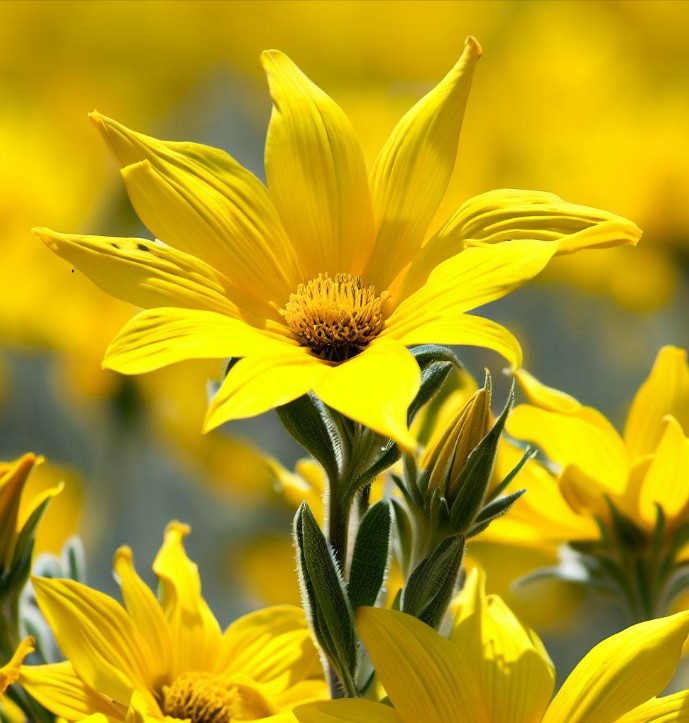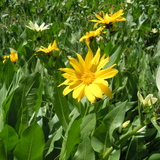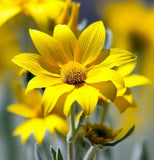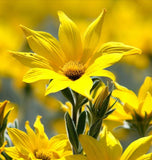WYETHIA amplexicaulis (Mule's Ears)
WYETHIA amplexicaulis (Mule's Ears) is a perennial wildflower native to the western regions of North America, particularly California and Oregon. Mule's Ears is a striking wildflower with unique features. It is characterized by its large, showy, daisy-like flowers and broad, oval-shaped leaves. The flowers have bright yellow petals that radiate from a central disk. They resemble the ears of a mule, hence the common name.
This plant typically grows in clumps and forms basal rosettes of leaves close to the ground. The leaves are elongated, with toothed margins, and they are usually covered in fine hairs, giving them a silvery-green appearance. The stems of Mule's Ears can reach a height of about 1 to 3 feet (30 to 90 cm). It thrives in full sun to partial shade and requires well-drained soil. Once established, it is relatively low-maintenance, although it may benefit from occasional watering during dry periods.
Mule's Ears is commonly found in open, sunny areas such as meadows, grasslands, and open woodlands. It prefers well-drained soils and can tolerate various soil types, including sandy or rocky soils.
The flowering period for Mule's Ears typically occurs in late spring to early summer, usually from May to July, depending on the location and climate. During this time, the plant produces tall flower stalks that bear one or more vibrant yellow flowers.
Mule's Ears is an important native plant for pollinators, particularly bees and butterflies. The flowers provide nectar and pollen, attracting these beneficial insects. The plant also serves as a food source for various herbivores, including deer and elk, which browse on its leaves.
Mule's Ears, with its vibrant yellow flowers and distinctive foliage, adds beauty and a touch of the wild to natural landscapes and gardens, while also supporting local wildlife.
| Number of Seeds | Max Coverage Area (Square Ft.) | |
|---|---|---|
| 0.5OZ | 813 | 41 |
| 1OZ | 1,625 | 81 |
| 1/4LB | 6,500 | 325 |
| 1/2LB | 13,000 | 650 |
| 1LB | 26,000 | 1,300 |
| 5LB | 130,000 | 6,500 |
Scientific Name: Wyethia Amplexicaulis
Common Name: Mule’s Ears
Plant Type: Perennial
Family: Asteraceae
Native Range: Central and Western North America
Height: Up to 32 inches
Spread: 12 to 32 inches
Habitat: Woodlands, Grassland, Seral coniferous forests
Zone: 4-9
Exposure: Full Sun
Blooming Season: Late spring to early summer
Attracts: Birds, Butterflies, Bee friendly
Resistant: Deer, Drought
Flower Color: Yellow
Flower Shape: Sunflower like
Water Requirement: Low
Soil Type: Sandy, Loam, Well-drained
Soil pH: Neutral (6.4)
Advantage: Easy to grow, Cut flowers
Uses: Native Americans fermented the roots to make sweet flavored food














